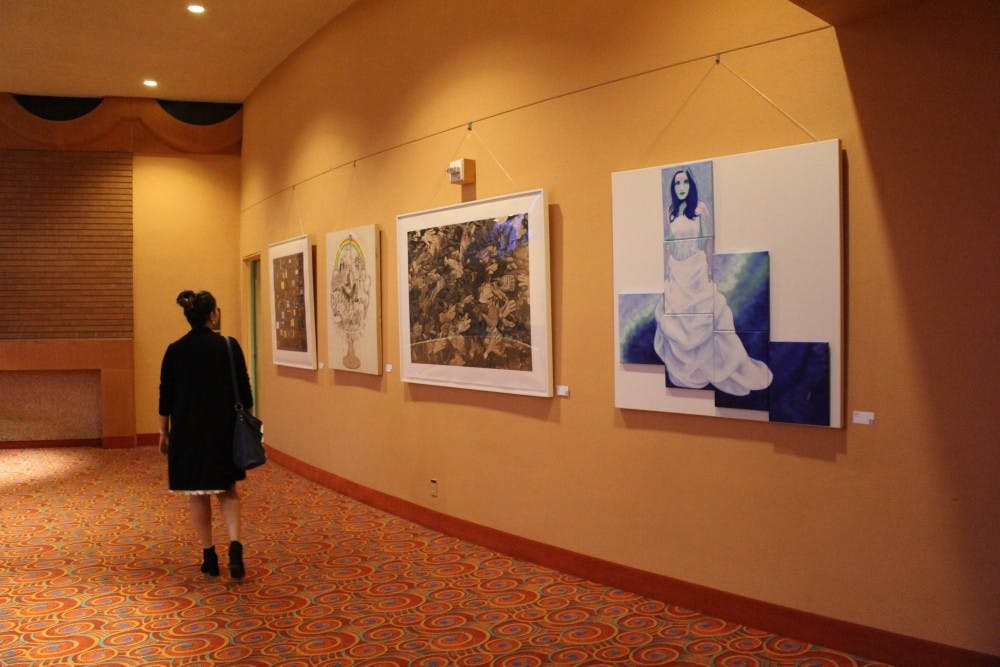The ACLU of Arizona, or AZCLU, has litigated to protect the rights of Arizona citizens for almost 60 years.
Now, the national organization’s Arizona branch is celebrating its 60th anniversary with an art exhibition titled “In This Together,” hosted by ASU Gammage, featuring 40 Arizona artists, some of whom are ASU faculty and alumni.
The AZCLU, originally chartered on June 22, 1959, lists ending Arizona’s ban on mixed-race marriages, defending the distribution of underground college newspapers like the University of Arizona’s Druid Free Press, fighting loyalty oaths for state employees and participating in the benchmark Miranda v. Arizona Supreme Court case among its accomplishments.
The exhibition, which opened Nov. 1 and will stay at Gammage until Dec. 17, will travel around Arizona over the next year before its final return to Tempe in October 2019.
AZCLU Executive Director Alessandra Soler said the exhibition’s message is in its title — that Arizonans need to unite work to build a “more perfect Arizona.”
“A more perfect Arizona means that … we’re inclusive, we’re fair, we’re just, we are educating rather than incarcerating,” she said. “It means that we’re keeping kids in school rather than suspending them.”
Denis Gillingwater, a photographer and professor emeritus at ASU, has photographs featured in the exhibition that depict TV screens showing surveillance cameras and satellites accompanied by words like “Machined” and “Traces/Traced.”
Gillingwater said that though some think talking politics is distasteful, it's hard to make sense of our world without addressing political themes in arenas like art.
“(Politics and religion) are two major factors in our lives, and ... a way we sell out and try to function in this country is to not talk about racial and cultural differences,” he said. “Everybody’s kind of living in their world but not really feeling safe because they don’t understand what other people’s thinking and behavior is at times. How do you begin to understand it if you don’t talk about it?”
Gillingwater, who said his parents were persecuted under McCarthyism during the Red Scare of the 1950s, said the ACLU’s sometimes controversial loyalty to constitutional freedoms is what motivated him to join the exhibition.
Soler said in a speech during a reception for the exhibition on Nov. 4 that the AZCLU plans to uphold its status as a bipartisan organization.
“We’re not just here for art’s sake,” she said. “We’re here to demonstrate that we are more than just one party. We are here because we’re hopeful about the future, and we’re here to celebrate everything we can accomplish together.”
Steve Farley, Arizona State Senator and former gubernatorial candidate, also had work at the show. He contributed a tapestry-style photograph of Syrian refugees trapped at a border.
Farley said his work speaks to a global dilemma, rather than one that is solely Arizonan.
“It’s just getting people to think about, ‘What is a border, why is it there, what’s happening, how do we deal with this whole thing?’” he said. “To me, that seems to be the big issue of our time around the world now.”
Chris Vena, who received his master's degree at ASU and is now a professor at the School of Art, has a featured painting depicting a meld of the artist’s firsthand experiences with individuals from a rally for President Donald Trump and an anti-Islam protest at a North Phoenix mosque.
Vena, who said he’s been to every major local political event over the last few years, said this painting is the only one of his larger series on political resistance that depicts what he describes as the “other side” of the civil rights debate.
“I wanted to include people who, in their minds, were also resisting but in a really scary, violent kind of way,” he said. “I wanted to do something to show the sort of gleefulness and intimidation that happens from that sort of Trump side, which is what I found was pretty consistent through all the events that I’ve (attended).”
Vena also said his time living in Istanbul during a period of civil unrest gave him a unique perspective on this violent side of American politics.
“Everybody’s engaged, for good or bad,” he said. “When I was in Turkey, it was inspiring to me because I saw … groups that normally hated each other working together against something that they saw as wrong. And to come back to the (U.S.) and see something like that happening here was inspiring to me and it’s kind of what keeps me going, as ugly as it gets.”
Reach the reporter at mrobbin9@asu.edu or follow @MelissaARobbins on Twitter.
Like The State Press on Facebook and follow @statepress on Twitter.




